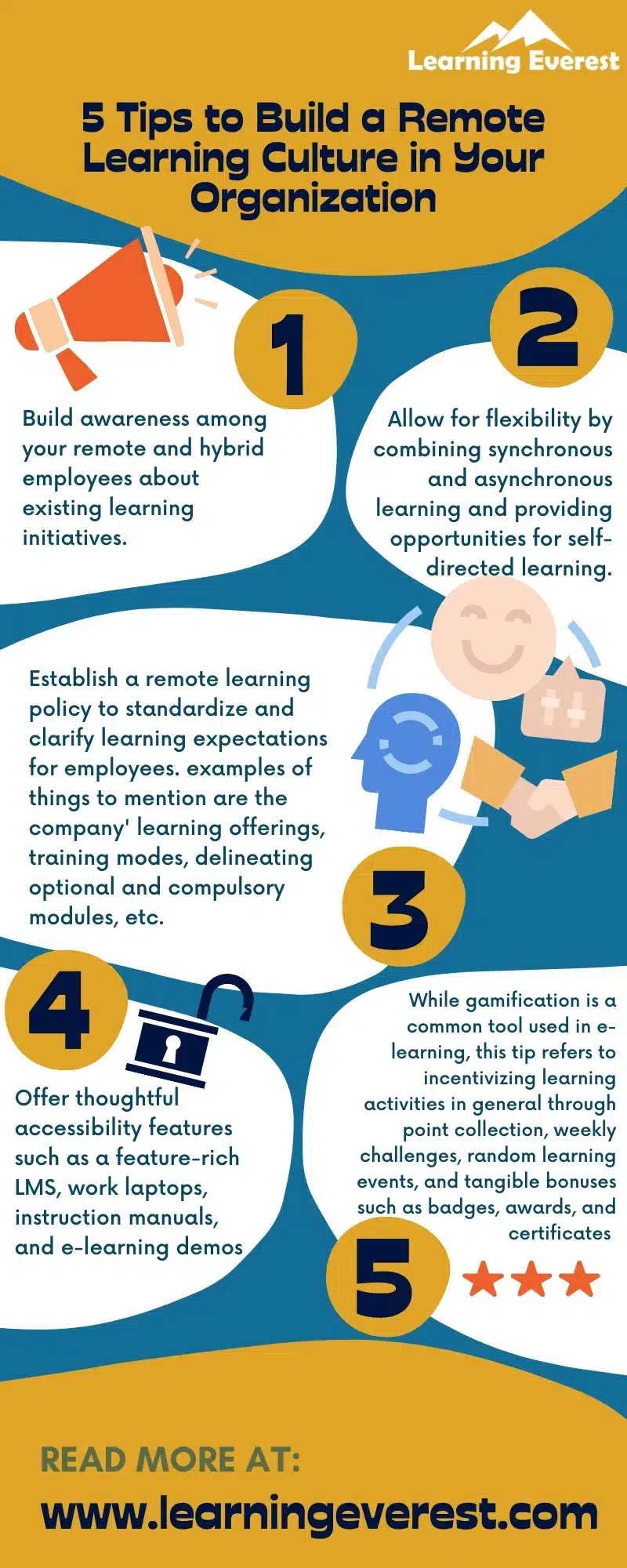A remote learning culture is one that supports remote and hybrid employees’ participation in continued organizational learning and information sharing. A majority of businesses today have at least a partially remote workforce, making it imperative that their training activities accommodate this section of employees. Building a learning culture requires consistent targeted efforts, and remote learning cultures have some additional considerations to be mindful of. This article will give you some tips to effectively build a remote learning culture in your organization.
Why is Building a Remote Learning Culture Important?
Businesses have followed fully remote and hybrid models of working for quite some time now. According to an Owl labs study from 2019, 16% of companies globally are fully remote and 62% of workers aged 22 to 56 report working remotely at least some of the time. This percentage is expected to increase to 73% by 2028 (Source: Upwork’s 2019 Future Workforce Report).
The COVID-19 pandemic further accelerated this momentum and two years later, it is safe to assume that remote work is here to stay. For instance, in the fall of 2021, only 19% of companies intended on resuming in-person work (Source: Fortune). Additionally, remote workers score higher on the happiness index and tend to have an overall better quality of life, leading to better job satisfaction as an indirect effect.
Thus, investing in remote employment and a remote learning culture is a competitive benefit for businesses today. State of the American Workplace Report prepared by Gallup is a good resource.
Tips for Building a Remote Learning Culture
Given that remote work has already become a mainstay and is projected to increase, learning organizations need to factor in strategies to promote a learning culture among their remote employees. Here are some ways to do so:
Build Awareness Among Remote and Hybrid Employees About Existing Learning Initiatives
The first tip is to educate employees about the learning opportunities available to them and how they can share their own knowledge with the organization. Learning opportunities can be provided in various forms, such as:
- E-learning modules
- Consumable booklets
- Podcasts
- Community posts on organizational social media
- Virtual workshops
Collaborative knowledge sharing, on the other hand, can be facilitated through forums, cyclic learning-oriented meetings, and mentorship programs.
Reserve brackets during orientations and onboarding sessions to tell new employees about all such initiatives and how they can access and participate in them.
Allow for Flexibility
For employees working in the remote or hybrid mode, setting aside “learning days” might not be as straightforward as in-office employees. The most common cause for this is logistical barriers. If employees feel swamped because of the expectation to learn, it will be counterproductive to creating a remote learning culture. Thus, it is recommended to strike a pleasant balance between synchronous and asynchronous learning. Such an approach will give remote employees the freedom to self-direct a part of their learning. Microlearning and nano-learning are excellent tools that create flexible learning environments and will even benefit in-office employees.
Establish a Remote Learning Policy
Having a remote learning policy in place will help standardize and clarify expectations for employees. Hence, it is highly recommended to develop a remote learning policy if you are trying to develop a remote learning culture. Here are some examples of things to add in your remote working policy:
- The company’s learning offerings (names of courses, skill areas, collaborations and partnerships with training institutions, etc.)
- The modes in which learning is offered (such as LMS, internal content libraries, subscriptions, etc.)
- A clear delineation of compulsory and optional modules
- Frequency of knowledge-sharing events and meetings
- Any incentives offered for volunteering to conduct sessions for other departments
- The company’s policy on in-office learning hours/days, the compensation offered, any special conditions on such days, etc.
Thoughtful Accessibility Features
Accessibility can sometimes become a massive barrier to remote learning. Employees might lack the right software, face device compatibility issues, or find e-learning difficult to navigate. To tackle such challenges, you can implement the following strategies:
- Invest in a feature-rich LMS
- Develop easily understandable instructions and guides for e-learning courses, LMS log-ins, video conferencing tools, mobile learning, etc.
- Begin each course with a quick how-to or animated demo
- Provide work laptops to remote employees
- Setup a helpdesk for remote learners
Gamify the Act of Learning
While gamification is a common tool used in e-learning, this tip refers to incentivizing learning activities in general. Systems such as point collection, weekly challenges, random learning events, and tangible bonuses such as badges, awards, and certificates for participating in learning activities will give employees some external sources of motivation to participate in the remote learning culture. As mentioned previously, a feature-rich LMS broadens accessibility, and is, thus, the best tool to gamify learning. Most premium LMS today have a variety of customization options and built-in engagement features listed above so you can freely pick one that fits your needs.
Infographics

5 Tips to Build a Remote Learning Culture in Your Organization Infographics





